- Home
- Amish Tripathi
The Secret of the Nagas Page 3
The Secret of the Nagas Read online
Page 3
‘Apparently, Bhagirath is not trusted by his father. And therefore, not by most Swadweepan kings or generals either. They believed he would have taken the soldiers, escaped to Ayodhya and declared himself Emperor.’
‘That’s ridiculous. Why does Dilipa not trust his own son?’
‘Because he believes Bhagirath thinks he is a fool and a terrible emperor.’
‘I’m sure Bhagirath doesn’t actually think that!’
‘Well, from what I’ve heard,’ smiled Veerbhadra as he junked out the ash from the chillum, ‘Bhagirath actually does think so of his father. And he’s not far from wrong, is he?’
Shiva smiled.
‘And then, to make matters worse,’ continued Veerbhadra, ‘the entire fiasco was blamed on Bhagirath. It was said that because he took a hundred thousand soldiers away, they lost the war.’
Shiva shook his head, saddened to see an intelligent man being rubbished by the idiots surrounding him. ‘I think he is a capable person, whose wings have been clipped.’
The tranquil moment was suddenly shattered by a loud scream. Shiva and Veerbhadra looked up to see a rider galloping away, while his companion, lagging far behind, was screeching loudly: ‘Help! Somebody help, Prince Bhagirath!’
Bhagirath had lost control of his speeding horse and was hurtling towards the cliff. A near certain death. Shiva jumped onto his horse and charged towards him with Veerbhadra in tow. It was a long distance, but the gentle slope helped Shiva and Veerbhadra make up the expanse quickly. Shiva rode in an arc to intercept Bhagirath’s horse. A few minutes later, Shiva was galloping along Bhagirath’s path. He was impressed that Bhagirath seemed calm and focussed, despite facing a life threatening situation.
Bhagirath was pulling hard on his reins, trying to slow his horse down. But his action agitated the horse even further. It picked up more speed.
‘Let the reins go!’ shouted Shiva, over the loud rumble of the threateningly close Sarayu river.
‘What?!’ screamed Bhagirath. All his training told him letting the reins go was the stupidest thing to do when a horse was out of control.
‘Trust me! Let it go!’
Bhagirath would later explain it to himself as fate guiding him towards the Neelkanth. At this moment, his instinct told him to forget his training and trust this barbarian from Tibet. Bhagirath let go. Much to his surprise, the horse immediately slackened.
Shiva rode in close. So close that he could almost whisper into the animal’s ear. Then he began to sing a strange tune. The horse gradually started calming down, reducing its speed to a canter. The cliff was coming close. Very close.
‘Shiva!’ warned Veerbhadra. ‘The cliff is a few hundred metres away!’
Shiva noted the warning, matching the pace of his horse with Bhagirath’s. The prince kept his control, staying on the horse, while Shiva kept singing. Slowly but surely, Shiva was gaining control. It was just a few metres before the cliff that Bhagirath’s horse finally came to a halt.
Bhagirath and Shiva immediately dismounted as Veerbhadra rode in.
‘Damn!’ said Veerbhadra, peering towards the cliff. ‘That was too close!’
Shiva looked at Veerbhadra, before turning towards Bhagirath. ‘Are you all right?’
Bhagirath kept staring at Shiva, before lowering his eyes in shame. ‘I’m sorry for putting you through so much trouble.’
‘No trouble at all.’
Bhagirath turned to his horse, hitting its face hard for embarrassing him.
‘It’s not the horse’s fault!’ shouted Shiva.
Bhagirath turned back to Shiva, frowning. Shiva walked towards Bhagirath’s horse, gently cradling its face, almost like it was a child being punished unfairly. Then he carefully pulled its reins out, signalled to Bhagirath to come closer and showed him the nail buried in the leather close to the horse’s mouth.
Bhagirath was shocked. The inference was obvious.
Shiva pulled the nail out, handing it to Bhagirath. ‘Somebody doesn’t like you, my friend.’
Meanwhile, Bhagirath’s companion had caught up with them. ‘My Prince! Are you all right?’
Bhagirath looked towards his companion. ‘Yes I am.’
Shiva turned towards the man. ‘Tell Emperor Dilipa his son is an exceptional rider. Tell him that the Neelkanth has yet to see a man with greater control over an animal, even when the odds were stacked so desperately against him. Tell him the Neelkanth requests the honour of Prince Bhagirath accompanying him to Kashi.’
Shiva knew that for Dilipa, this would not be a request but an order. This was probably the only way of keeping Bhagirath safe from the unknown threat to his life. The companion immediately went down on his knee. ‘As you command, My Lord.’
Bhagirath stood dumbfounded. He had come across people who plotted against him, people who took credit for his ideas, people who sabotaged him. But this... This was unique. He turned to his companion. ‘Leave us.’
The man immediately rode away.
‘I have experienced such kindness from only one person up until now,’ said Bhagirath, his eyes moist. ‘And that is my sister, Anandmayi. But blood justifies her actions. I don’t know how to react to your generosity, My Lord.’
‘By not calling me Lord,’ smiled Shiva.
‘That is one order I would request you to allow me to refuse,’ said Bhagirath, his hands folded in a respectful namaste. ‘I will follow any other order you give. Even if it is to take my own life.’
‘Now don’t get so dramatic! I am not about to ask you to commit suicide right after having worked strenuously to save your life.’
Bhagirath smiled softly. ‘What was it you sang to my horse, My Lord?’
‘Sit with me over a chillum sometime and I will teach you.’
‘It will be my honour to sit at your feet and learn, My Lord.’
‘Don’t sit at my feet, my friend. Sit beside me. The sound carries a little better there!’
Bhagirath smiled as Shiva patted him on the shoulder.
Chapter 2
Sailing Down the Sarayu
‘Tell Princess Anandmayi,’ said Parvateshwar to the Captain of the Women’s Guard at Anandmayi’s palace entrance, ‘that General Parvateshwar is waiting outside.’
‘She had told me she was expecting you, General,’ said the Captain bowing low. ‘May I request you to wait a moment while I go and check on her?’
As the Captain walked into Anandmayi’s chamber, Parvateshwar turned around. Shiva had made him in-charge of the expedition to Kashi. Shiva knew if he left the organisation to one of Ayodhya’s administrators, they would probably be debating the mode of transport for the next three years. Parvateshwar, with his typical Suryavanshi efficiency, had seen to the arrangements within a week. The contingent was to travel east down the Sarayu on royal boats, to the city of Magadh, where the river merged into the mighty Ganga. From there, they would turn west to sail up the Ganga to Kashi, the city where the supreme light shines.
Parvateshwar had been inundated with inane requests from some of the Ayodhya nobility who were taking the opportunity to travel with the Neelkanth. He did plan to honour some strange appeals, like one from a superstitious nobleman who wanted his boat to leave exactly thirty two minutes after the beginning of the third prahar. Others he had flatly refused, such as a request from another nobleman for his boat to be staffed only by women. The General was quite sure that Anandmayi must also have some special arrangements she wanted made.
Like carrying a ship hold of milk for her beauty baths!
The Captain was back shortly. ‘You may go in, General.’
Parvateshwar marched in smartly, bowed his head, saluted as he must to royalty and spoke out loud, ‘What is it you want, Princess?’
‘You needn’t be so coy, General. You can look up.’
Parvateshwar looked up. Anandmayi was lying on her stomach next to a picture window overlooking the royal gardens. Kanini, her masseuse, was working her magic on the princess’ exotic and sup
ple body. Anandmayi only had one piece of cloth draped loosely from her lower back to her upper thighs. The rest of her, a feast for his eyes.
‘Beautiful view, isn’t it?’ asked Anandmayi.
Parvateshwar blushed a deep red, his head bowed, eyes turned away. To Anandmayi, he appeared to be like the rare cobra male that bows his head to its mate at the beginning of their mating dance, as though accepting the superiority of its partner.
‘I’m sorry, Princess. I’m so sorry. I didn’t mean to insult you.’
‘Why should you apologise for looking at the royal gardens, General? It is allowed.’
Parvateshwar, a lifelong celibate, was mollified. It did not appear as though Anandmayi had misunderstood his intentions. He whispered in a soft voice, eyes on the floor, ‘What can I do for you, Princess?’
‘It’s quite simple really. A little further south down the Sarayu is the spot where Lord Ram had stopped with his Guru Vishwamitra and brother Lakshman on his way to slay the demon Tadaka. It is the spot where Maharishi Vishwamitra taught Lord Ram the arts of Bal and Atibal, the fabled route to eternal good health and freedom from hunger and thirst. I would like to halt there and offer a puja to the Lord.’
Parvateshwar, pleased at her devotion to Lord Ram, smiled. ‘Of course, we can stop there Princess. I will make the arrangements. Would you need any special provisions?’
‘None whatsoever. An honest heart is all that is needed for a prayer to reach the Lord.’
Parvateshwar looked up for a brief moment, impressed. Anandmayi’s eyes, however, seemed to be mocking him. He growled softly. ‘Anything else, Princess?’
Anandmayi grimaced. She was not getting the reaction that she had desired. ‘Nothing else, General.’
Parvateshwar saluted smartly and left the room.
Anandmayi kept staring at Parvateshwar’s retreating form. She sighed loudly and shook her head.
‘Gather around please,’ said the Pandit, ‘we will commence the puja.’
Shiva’s contingent was at Bal-Atibal kund, where Guru Vishwamitra had taught Lord Ram his legendary skills.
The Neelkanth was unhappy that many of Ayodhya’s nobility had inveigled their way into the voyage to Kashi. What should have been a super-fast five ship convoy had turned into a lethargic fifty ship caravan. The straightforward Parvateshwar had found it difficult to deny the convoluted logic of the Chandravanshi nobility. Therefore, Shiva was delighted that Bhagirath had found an ingenious method to cut down the numbers. Craftily, he had suggested to one noble that he should rush to Kashi and set up a welcoming committee for the Neelkanth, and thus gain favour with the powerful Lord. Seeing one noble hustle away, many others had followed, in a mad dash to be the first to herald the arrival of the Neelkanth at Kashi. Within hours, the convoy had been reduced to the size that Shiva desired.
The puja platform had been set up some fifty metres from the riverbank. It was believed that anyone who conducted this prayer with full devotion would never be inflicted with disease. Shiva, Sati, Parvateshwar, Ayurvati, Bhagirath and Anandmayi sat in the innermost circle next to the Pandit. Others like Nandi, Veerbhadra, Drapaku, Krittika and the men of the joint Suryavanshi-Chandravanshi brigade sat a little further back. The earnest Brahmin was reciting Sanskrit shlokas in the exact same intonations that had been taught to him by his Guru.
Sati was uneasy. She had an uncomfortable feeling that someone was watching her. For some strange reason, she felt intense hatred directed at her. Along with that she also felt boundless love and profound sadness. Confused, she opened her eyes. She turned her head to her left. Every single person had his eyes closed, in accordance with the guidelines of this particular puja. She then turned to the right and started as she saw Shiva gazing directly at her. His eyes open wide, reflecting an outpouring of love, Shiva’s face sported a slight smile.
Sati frowned at her husband, gesturing with her eyes that he should concentrate on his prayers. Shiva, however, pursed his lips together and blew her a kiss. A startled Sati frowned even more. Her Suryavanshi sensibilities felt offended at such frivolous behaviour, which she considered a violation of the code. Shiva pouted like a spoilt child, closed his eyes and turned towards the fire. Sati turned too, eyes closed, allowing herself a slight smile at the fact that she had been blessed with an adoring husband.
But she still felt she was being watched. Stared at intently.
The last ship of the Neelkanth’s convoy turned round the bend in the Sarayu. With his enemies out of sight, the Naga emerged from the trees. He walked briskly to the place where the Brahmin had just conducted the puja. He was followed by the Queen of the Nagas and a hundred armed men. They stopped at a polite distance from the Naga, leaving him alone.
Karkotak, Prime Minister to the Queen of the Nagas, looked up at the sky, judging the time. Then he looked disconcertedly at the Naga in the distance. He wondered why the Lord of the People, as the Naga was referred to in his lands, was so interested in this particular puja. The Lord had far greater powers and knowledge. Some even considered him better than the Naga Queen.
‘Your Highness,’ said Karkotak to the Queen, ‘do you think it advisable to emphasise to the Lord of the People the importance of returning home?’
‘When I want your advice, Karkotak,’ said the Queen in a curt whisper, ‘I will ask for it.’
Karkotak immediately retreated, terrified as always of his Queen’s temper.
The Queen turned back towards the Naga, her mind considering Karkotak’s words. She had to admit that her Prime Minister was right. The Nagas had to return to their capital quickly. There was little time to waste. The Rajya Sabha, the Naga Royal Council was to be held soon. The issue of medical support to the Brangas would come up again. She knew that the severe cost of that support was turning many Nagas against the alliance with the Brangas, especially the peace-loving ones who wanted to live their ostracised lives quietly, calling it a product of their bad karma. And without the alliance, her vengeance was impossible. More importantly, she could not desert the Brangas in their hour of need when they had been unflinchingly loyal to her.
On the other hand, she could not abandon her nephew, the Lord of the People. He was troubled; the presence of that vile woman had disturbed his usual calm demeanour. He was taking unnecessary risks. Like the idiotic attack on Sati and Shiva at the Ramjanmabhoomi temple. If he didn’t want to kill her, why the hell did he put his own person in such grave peril? What if he had been killed? Or worse, caught alive? He had justified it later as an attempt to draw Sati out of Ayodhya, as capturing her within the city was impossible. For what it was worth, he had succeeded in drawing her out on a voyage to Kashi. But she was accompanied by her husband and a whole brigade. It was impossible to kidnap her.
The Queen saw her nephew move slightly. She stepped forward a little distance, motioning for Karkotak and the men to remain behind.
The Naga had taken out a knife from a newly built hold on his belt. It was the knife Sati had flung at him at the Ramjanmabhoomi temple. He looked at it longingly, letting the blade run up his thumb. Its sharp edge cut his skin lightly. He shook his head angrily, dug the knife hard into the sand and turned around to walk towards the Queen.
He stopped abruptly. Oddly hesitant.
The Queen, clearly out of her nephew’s earshot, willed her thoughts in a quiet whisper. ‘Let it go, my child. It’s not worth it. Let it go.’
The Naga stood rooted to his spot. Indecision weighed heavy on him. The men in the distance were shocked to see their Lord in such a weak state. To the Queen’s dismay, the Naga turned around and walked back to the spot where he had buried the knife. He picked it up carefully, held it reverentially to his forehead and put it back into his side hold.
The Queen snorted in disgust and turned around, signalling Karkotak to come forward. She knew she had no choice. She would have to leave her nephew with bodyguards, while she herself would ride out towards Panchavati, her capital.
‘Portage charges? What rubbis
h!’ bellowed Siamantak, Ayodhya’s Prime Minister. ‘This ship belongs to the Emperor of Swadweep. It carries a very important individual, the most important in the land.’
Siamantak was in the pilot boat of Andhak, Port Minister of Magadh, who unlike typical Chandravanshis, was known to turn a blind eye to everything except the letter of the law. Siamantak turned to look nervously at the massive ship that carried the Neelkanth. Shiva was standing on the balustrade with Parvateshwar and Bhagirath. Siamantak was aware that Shiva wanted to stop at Magadh. He had expressed a desire to visit the Narsimha temple on the outskirts of the city. Siamantak did not want to disappoint the Neelkanth. However, if he paid portage charges for the ship, it would set a dangerous precedent. How could the Emperor’s ship pay portage in his own empire? It would open a can of worms with all the river port kingdoms across the empire. The negotiations with Andhak were delicate.
‘I don’t care who the ship belongs to,’ said Andhak. ‘And I don’t care if you have Lord Ram himself on that ship. The law is the law. Any ship that ports at Magadh has to pay portage. Why should Emperor Dilipa be worried about a small fee of one thousand gold coins?’
‘It’s not the money. It’s the principle,’ argued Siamantak.
‘Precisely! It is the principle. So please pay up.’
Shiva was getting impatient. ‘What the hell are they talking about for so long?’
‘My Lord,’ said Bhagirath. ‘Andhak is the Port Minister. He must be insisting that the law of portage charges be followed. Siamantak cannot allow any ship owned by my father to pay portage. It is an insult to my father’s fragile ego. Andhak is an idiot.’
‘Why would you call a person who follows the law stupid?’ frowned Parvateshwar. ‘On the contrary, he should be respected.’
‘Sometimes even circumstances should be looked at, General.’
‘Prince Bhagirath, I can understand no circumstance under which the letter of the law should be ignored.’
Shiva did not want to witness yet another argument between the Suryavanshi and Chandravanshi way of life. ‘What kind of ruler is the King of Magadh?’

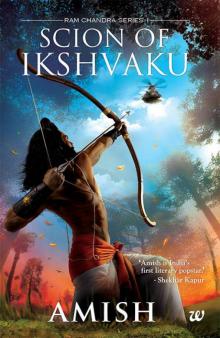 Scion of Ikshvaku
Scion of Ikshvaku The Secret of the Nagas
The Secret of the Nagas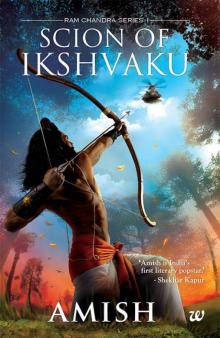 Scion of Ikshvaku (Ram Chandra Series) FlyLeaf.ORG
Scion of Ikshvaku (Ram Chandra Series) FlyLeaf.ORG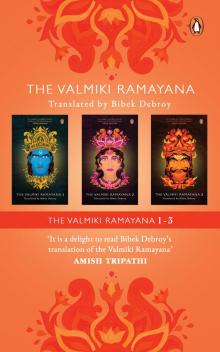 The Valmiki Ramayana
The Valmiki Ramayana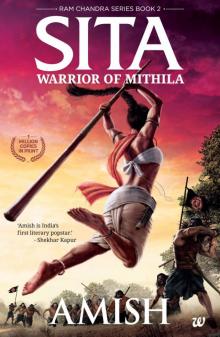 Sita: Warrior of Mithila
Sita: Warrior of Mithila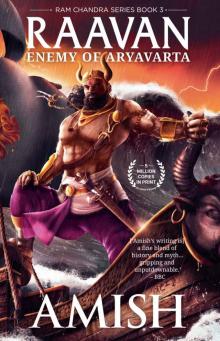 Raavan- Enemy of Aryavarta
Raavan- Enemy of Aryavarta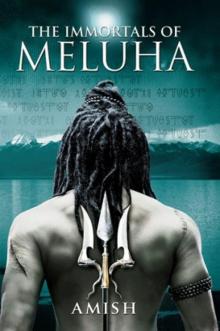 Immortals of Meluha
Immortals of Meluha